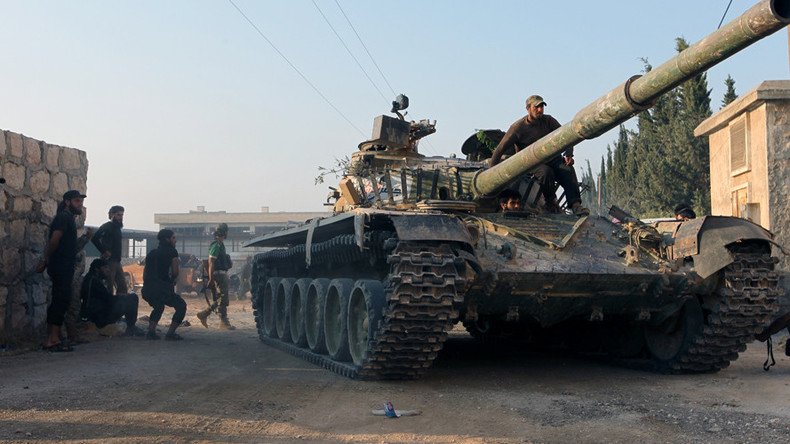'US-backed Syrian opposition using ceasefire to regroup and retake Aleppo'

The US is so confused, because it backs the Saudis on the one hand, but they want to have a ceasefire on the other, Michael Maloof, former Pentagon official told RT America’s Manila Chan.
Despite a ceasefire in Syria that went into effect several days ago, shelling continues. Russia’s Defense Ministry claims that diverse rebel groups backed by the US have ratcheted up attacks of residential areas.
RT: Russia and the United States both are pointing fingers at each other. What do you think is really happening on the ground?
Michael Maloof: Well, I think what’s happening on the ground is that the so-called moderates that the US supports is vying for more positions of strength. They are using the lull and the ceasefire to regain battlefield positioning. They want to take Aleppo. This is going to continue on. This has been spurred from the outside by the Saudis, the Qataris – people who are sponsoring this. They don’t want to have a settlement with President [Bashar] Assad of Syria – they want him out.
We are all working at cross purposes. The US is so confused, because it backs the Saudis on the one hand, but they want to have a ceasefire on the other. Yet, they are not sharing intelligence on who the so-called moderates really are. It is just one Kabuki.
‘US using smoke-screen to cover up violations of their part of #SyrianCeasefire deal’ – Russian govt https://t.co/vqOsZPP2lN
— RT (@RT_com) 15 сентября 2016 г.
RT: This ceasefire is supposed to help with medical and other humanitarian aid. It doesn’t account for what are deemed as terrorist groups like ISIS, and the group formerly known as Al-Nusrah Front. Isn’t this a crucial time for both sides to attack those terror organizations without fear of attacking and shelling each other?
MM: First of all, they can’t identify who the moderates are. We don’t have that kind of leverage over them. Secondly, the humanitarian aid is not really rolling in. The problem is that people who are taking in the humanitarian aid are afraid they are going to be attacked because of these groups who are trying to vie for positions and strength. This could actually bring an end to this latest peace initiative before it gets down the road.
RT: Do you think the aid will get to the people?
MM: It depends. If they can reach some arrangements with a lot of the rebel forces that are in that area, and the question is: who controls them? Right now that is what the Russians are asking for: “Tell us who these groups are; let’s have full accountability; let’s declassify the agreement” I don’t know why it’s classified in the first place. Even the French have asked for it to be declassified, so they know who they are supposed to be working with.
RT: The disastrous civil war in Syria has been going for five years, it’s killed 430,000 people. Can this ceasefire hold at all, at least perhaps enough to possibly lead to real discussions on how to end it?
MM: Well, that is the hope and expectation. But as we’ve seen with the previous agreements, they fall apart within a week or two. I suspect this will not hold, but the principals are going to continue to try to push for it. The UN representative on Syria really wants to continue the Geneva process and get the rebels to come together and agree to a transitional government. But the problem again is: does Assad stay or go even during the transition. Even the Turks have agreed he doesn’t have to go just yet, and they are supposed to be asserting some outside pressure and control over them. We still need to see how that evolves and how that unfolds.
US-Russia deal on Syrian ceasefire: ‘Positive sign but questions remain’ (Op-Edge) https://t.co/E6YifhVv1j
— RT (@RT_com) 10 сентября 2016 г.
The statements, views and opinions expressed in this column are solely those of the author and do not necessarily represent those of RT.












